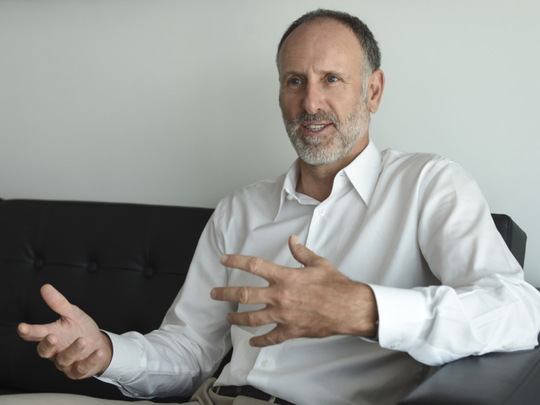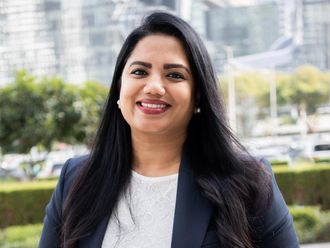
DUBAI: OSN is aiming to vastly increase its subscriber base over the next five years, whilst investing in the production of premium Arabic language content, the company’s recently-appointed chief executive has said.
The network’s subscriber base rose consistently from its inception in 2009, the year that Orbit and Showtime merged to create OSN, until around 2014, when more affordable Pay TV options began to dampen the Dubai network’s growth.
According to IHS Markit TV Media Intelligence, between the second quarter of 2015, and the fourth quarter of 2016, OSN lost around 12 per cent of its customer base in the Mena (Middle East and North Africa) region.
Refusing to reveal the exact target for subscribers that CEO Martin Stewart announced internally when he arrived in August 2016, the chief executive said instead: “Let’s put it this way, we’re not talking about 10 per cent growth, we’re not talking about 20 per cent growth, we’re not even talking about 50 per cent growth. We are talking about many multiples of where we are today, and that’s where we want to be in that three- to five-year time frame.”
“The magnitude of what we’re undertaking …” Stewart said, pausing momentarily. “It’s a big, big, big change.”
Analysts attribute much of the drop-off in subscriber levels to OSN’s high prices. This issue was exacerbated in November 2015 when regional rival BeIN Media launched its own entertainment packages, priced nearly 40 per cent lower than OSN’s.
Stewart said that addressing the price issue was his first prerogative when he joined the network from UK’s Football Association (The FA), where he was chief financial officer (CFO), last year. He was previously CFO of Sky, one of Europe’s largest entertainment companies.
“The first thing we wanted to focus on was price. Our service needed to be affordable to everyone, and we’ve made those changes” Stewart said.
These changes included dropping the basic subscription to OSN to Dh79 in February of this year.
The second item on the chief executive’s agenda was revamping the company’s OTT platform.
Over-the-top content, or OTT, refers to the transmission of media via the internet. Netflix is the most famous example of such a platform.
In August 2017, OSN launched Wavo, its new streaming service, starting at $6.99 per month. The service features all of HBO’s content, OSN’s movie library, and live sports such as golf and cricket.
OSN Go, the company’s previous streaming service, struggled to attract subscribers. According to IHS Markit Digital Media Intelligence, the platform had less than 35,000 subs at the end of 2016 across the whole of the MENA region.
But Martin Stewart is banking on the rejuvenated Wavo being a huge hit.
“Wavo will become between 35-40 per cent of our business within three to five years. That’s the scale of our ambition that we’re undertaking,” he said.
Market projections for OTT services in the region predict many millions of new subscribers within just a few years.
When the market does begin to soar, Stewart says he wants to be there to capitalise on it.
“We want to ensure that we are the market leader. We want to provide something that is different and distinctive,” Stewart said.
This last point ties directly in to the chief executive’s third and final key objective at the Middle East’s largest privately-owned entertainment company: Provide something different to its customers.
Perhaps surprisingly, 75 per cent of these customers speak Arabic.
Because OSN owns the exclusive rights to HBO’s content in the Middle East, there has been a perception among some that it was a network aimed at Western expats.
Stewart says this is definitely not the case, however.
“We sell HBO to Arabic speakers, but with the majority of our customer base made up of Arabic speakers, we are not an expat focused business,” he said.
What this means, according to Stewart, is that his company must provide these customers with a mix of everything: “If you want to provide a service to Arabic speakers that is very interesting and very relevant to them, it needs to have some great Western entertainment, some good sports that are interesting to them, a great movie service, and it’s got to have content that reflects the way they live and the things they are interesting.”
That is an unbeatable combination, he added.
On the numbers, Stewart is backing the right horse: IHS Markit forecasts pay-TV growth to continue in the Middle East and North Africa (MENA), with households subscribing to pay-TV expected to hit seven million in 2021.
Revenues are projected to almost double to $4.03 billion the same year.
The vast majority of these new subscribers, located in places like Saudi Arabia, the UAE, and Egypt, will speak Arabic.
As a result of this, and the fact that Arabic speakers already make up the vast majority of its subscriber base, OSN has decided to invest in producing its own, premium Arabic language content, its chief executive revealed.
Calling it an underserved segment of the market, Stewart says it’s “about understanding the reality of who our customers are.”
“What I would like to see us do is … own more of that [Arabic language] content. I think in the long run, having something that’s exclusive that brings people to you is key. Future success is built on a supply of content that can be served exclusively to your customers. The only way to guarantee that is not to rent it, but to produce it yourself,” he said.
Outlining his plan, Stewart said that whilst OSN already produces such content, it is on a much smaller scale.
“I’m talking about expanding the scale. We plan to make it bigger,” he added.
Stewart would not be drawn on any specifics. When asked if he could reveal any details of projects he had greenlit, or planned to greenlight, Stewart responded: “Not at the moment. It’s something we’re working on at the moment, but there’s nothing I want to share today.”
When pay-TV first launched in the region 25 years ago, the CEO says it was simply a case of piping content in from the West. As the countries have developed, so has the desire for local voices, local experiences, and local entertainment.
“It’s about reflecting life and experiences of the people in this region,” said Stewart, adding: “HBO is a fantastic service, but it tells stories. If we can tell stories, with that type of quality, that actually resonate with people from this region, I think there’s a gap still in the market for that kind of drama.”










